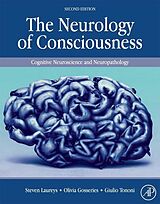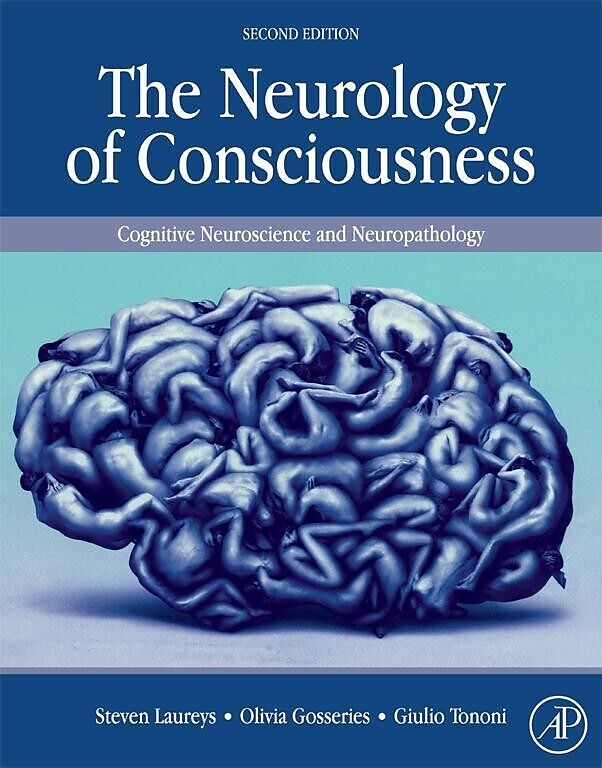The Neurology of Consciousness
Einband:
E-Book (pdf)
EAN:
9780128011751
Untertitel:
Cognitive Neuroscience and Neuropathology
Genre:
Psychologie
Herausgeber:
Elsevier Reference Monographs
Auflage:
2. Aufl.
Anzahl Seiten:
488
Erscheinungsdatum:
12.08.2015
The second edition of The Neurology of Consciousness is a comprehensive update of this ground-breaking work on human consciousness, the first book in this area to summarize the neuroanatomical and functional underpinnings of consciousness by emphasizing a lesional approach offered by the study of neurological patients. Since the publication of the first edition in 2009, new methodologies have made consciousness much more accessible scientifically, and, in particular, the study of disorders, disruptions, and disturbances of consciousness has added tremendously to our understanding of the biological basis of human consciousness. The publication of a new edition is both critical and timely for continued understanding of the field of consciousness. In this critical and timely update, revised and new contributions by internationally renowned researchers-edited by the leaders in the field of consciousness research-provide a unique and comprehensive focus on human consciousness. The new edition of The Neurobiology of Consciousness will continue to be an indispensable resource for researchers and students working on the cognitive neuroscience of consciousness and related disorders, as well as for neuroscientists, psychologists, psychiatrists, and neurologists contemplating consciousness as one of the philosophical, ethical, sociological, political, and religious questions of our time.
New chapters on the neuroanatomical basis of consciousness and short-term memory, and expanded coverage of comas and neuroethics, including the ethics of brain death The first comprehensive, authoritative collection to describe disorders of consciousness and how they are used to study and understand the neural correlates of conscious perception in humans. Includes both revised and new chapters from the top international researchers in the field, including Christof Koch, Marcus Raichle, Nicholas Schiff, Joseph Fins, and Michael Gazzaniga
The second edition of The Neurology of Consciousness is a comprehensive update of this ground-breaking work on human consciousness, the first book in this area to summarize the neuroanatomical and functional underpinnings of consciousness by emphasizing a lesional approach offered by the study of neurological patients. Since the publication of the first edition in 2009, new methodologies have made consciousness much more accessible scientifically, and, in particular, the study of disorders, disruptions, and disturbances of consciousness has added tremendously to our understanding of the biological basis of human consciousness. The publication of a new edition is both critical and timely for continued understanding of the field of consciousness. In this critical and timely update, revised and new contributions by internationally renowned researchers-edited by the leaders in the field of consciousness research-provide a unique and comprehensive focus on human consciousness. The new edition of The Neurobiology of Consciousness will continue to be an indispensable resource for researchers and students working on the cognitive neuroscience of consciousness and related disorders, as well as for neuroscientists, psychologists, psychiatrists, and neurologists contemplating consciousness as one of the philosophical, ethical, sociological, political, and religious questions of our time.New chapters on the neuroanatomical basis of consciousness and short-term memory, and expanded coverage of comas and neuroethics, including the ethics of brain death The first comprehensive, authoritative collection to describe disorders of consciousness and how they are used to study and understand the neural correlates of conscious perception in humans. Includes both revised and new chapters from the top international researchers in the field, including Christof Koch, Marcus Raichle, Nicholas Schiff, Joseph Fins, and Michael Gazzaniga
Autorentext
Giulio Tononi ist Mediziner und Senior Fellow für theoretische und experimentelle Neurobiologie am Neurosciences Institute (USA). Er arbeitet hauptsächlich zu Fragen der Schlaf- und Bewußtseinsforschung. Er lebt in San Diego, Kalifornien.
Leseprobe
Foreword
Richard Frackowiak, Centre Hospitalier Universitaire Vaudois, University of Lausanne and Ecole Polytechnique Fédérale de Lausanne, Lausanne, Switzerland Jean-Pierre Changeux, Pasteur Institute and Collège de France, Paris, France Looking back is often disappointing and not really a good way of deciding what to do next. But in cognition research we can't help but muse on those who claimed as little as 25 years ago that consciousness was not a subject respectable neuroscientists should concern themselves with. The problem was too complex, the concept too ill-defined, the level of organization unreachable and so on. Predicting the future is a difficult game, which is presumably why, as a community, scientists prefer experimentation based on models, peer review, and evaluation. Happily so, this book clearly demonstrates that not only is consciousness a viable subject for scientific study but also that the diverse meanings of the word "consciousness" firm up as new measuring instruments and experimental methods become available. As a word, "consciousness" is rich, means too many things and requires deconstruction to become tractable. There are, for example, the contents of consciousness, mechanisms that access them, issues of awareness, implicit and explicit ways of recovering conscious events and so on. In common language, all these are subsumed in one way or another under the single term, consciousness. A simple analogy might be with the term "memory"-understood by all, but dissection of that concept by science into various types and mechanisms has enriched its comprehension considerably. An initial division into normal "conscious access" and its disorders in humans is potentially helpful. It is a universal experience to oscillate daily between sleep and wakefulness, thereby regularly to experience loss of conscious access. Similarly, general anesthesia systematically manifests by a chemically elicited and reversible "loss of consciousness," a widely accepted use of the word consciousness in a medical context. From the neurological standpoint, it is commonly held that to lose consciousness (in the sense of a global loss of conscious access) it is necessary to suffer bilateral hemispheric damage or a midbrain lesion. Certainly this is true, but there are states in which apparent changes in consciousness are found that are limited to bilateral thalamic damage; so, bi-hemispheric, but limited in extent to critical regions. Consciousness can be impaired by large intracerebral lesions, such as hemorrhages, tumors, or aneurysms, that distort the brain by occupying space and impinging directly on both hemispheres, or pushing down onto the midbrain or by disease of local origin that spreads to involve these regions, as in focal epilepsies. It can also result from metabolic starvation as in hypoxia or with poisoning, for example, with gases such as carbon dioxide, carbon monoxide, or nitrous oxide. These phenomena have been known for a long time and, though dramatic, they give little insight into the neurobiology of consciousness, other than by providing the gross anatomical substrate described above. Generally disturbed consciousness can occur in milder form, sometimes manifesting as confusion, and can also be caused by poisoning or metabolic insults from various pharmacological or toxic agents. Sometimes these are taken voluntarily; often they can modify the contents of consciousness in a repeatable and predictable manner. Alcohol is a clear example and various psychoactive drugs can either alter consciou…

Leider konnten wir für diesen Artikel keine Preise ermitteln ...
billigbuch.ch sucht jetzt für Sie die besten Angebote ...
Die aktuellen Verkaufspreise von 6 Onlineshops werden in Realtime abgefragt.
Sie können das gewünschte Produkt anschliessend direkt beim Anbieter Ihrer Wahl bestellen.
Loading...
Die aktuellen Verkaufspreise von 6 Onlineshops werden in Realtime abgefragt.
Sie können das gewünschte Produkt anschliessend direkt beim Anbieter Ihrer Wahl bestellen.
| # | Onlineshop | Preis CHF | Versand CHF | Total CHF | ||
|---|---|---|---|---|---|---|
| 1 | Seller | 0.00 | 0.00 | 0.00 |
